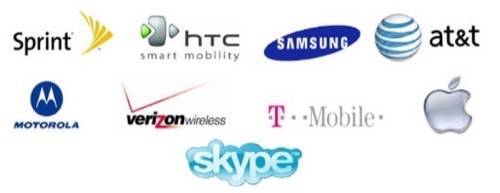
In the US mobile phone carriers run closed networks: my Samsung phone will only run on the Verizon network, and if I switch to another carrier, the applications I bought over Verizon’s service won’t come with me. This set up has big Internet companies up in arms. Last March, for example, Google CEO Eric Schmidt accused the carriers of creating “walled gardens” that kept Internet companies out. The carriers, however, say that they spend billions of dollars on their networks and shouldn’t be forced to open them up. In March 2005, then-AT&T CEO Edward Whitacre (though it was SBC at the time) told Businessweek that the big telecom companies spent billions laying fiber optic line and it was unfair for Internet companies to have free access. “They use my lines for free — and that’s bull. For a Google or a Yahoo! or a Vonage or anybody to expect to use these pipes for free is nuts!” he said.
It wasn’t always this way, however. In 2001 SBC signed a deal that paid Yahoo! in exchange for the right to a co-branded portal and access to other Yahoo! apps. Now, reports Mercury News, SBC is part of AT&T, the biggest phone carrier in the US, and is not so desperate. They plan to use their position of dominance over the mobile web to control it in a way the failed to do with the traditional web.
“As mobile use of the Internet takes off, AT&T and other wireless carriers are poised to exert tight control over the mobile Web, putting search giants like Yahoo in an uncharacteristically weak negotiating position. That’s because unlike the regular phone network, the wireless networks are closed. Indeed, neither Google’s nor Yahoo’s showcase applications for mobile phones are available to Verizon subscribers, the second-biggest wireless company in the United States.”
But not everyone is taking it lying down. Skype, a VoIP company that has drawn the ire of big telecom companies in the past who accuse it of using their infrastructure to undercut their prices, has filed a complaint with the US Federal Communications Commission accusing the phone companies of violating laws by creating closed networks.
“Carriers are using their considerable influence over handset design and usage to maintain control over and limit subscribers’ right to run software communications applications of their choosing,” said Skype in their FCC filing.
In the US, the phone above won’t work on every network.

According to Skype, wireless carriers should be forced to follow a 1968 FCC rule, which stipulates that any device must be able to connect to any US phone carrier. Skype’s ulterior motive, of course, is for its customers to be able to purchase an unlimited data plan on any wireless network and then make calls over the Skype software. There is a technical problem with Skype’s vision, however.
In most non-US markets carriers use the GSM standard, but in America carriers use a variety of technical standards. That means that some phones simply can’t function on multiple networks with the current set up. In order for Skype’s proposal to work, mobile phone carriers would either need to spend billions updating their networks to conform to a single standard, or all handsets would need to support multiple standards.
Still, as a frustrated US mobile customer myself, it would be great if carriers were forced to tear down their walled gardens and the mobile web could become as open as the traditional Internet. Some analysts predict that is what will happen eventually anyway. “If you think about AOL in 1995, they were in a similar position of power,” says Charles Golvin from Forrester Research. “That broke down because consumers wanted access to the open Internet. I would argue that the same will happen in mobile.”
And of course, if Skype gets its way, it will mean an iPhone that works on any network.










